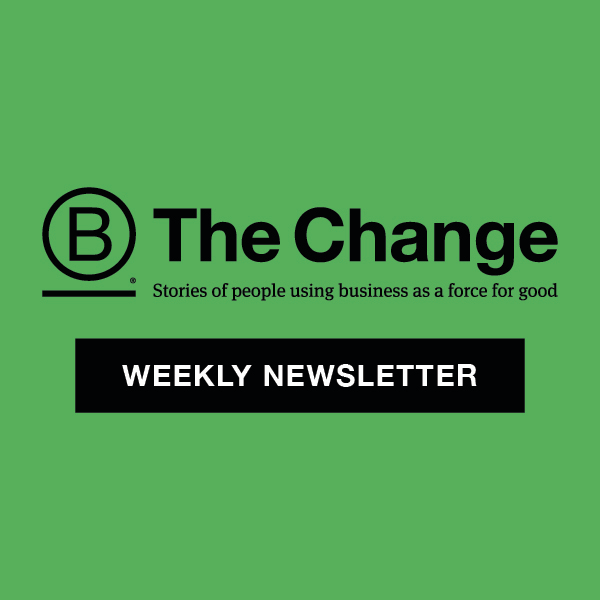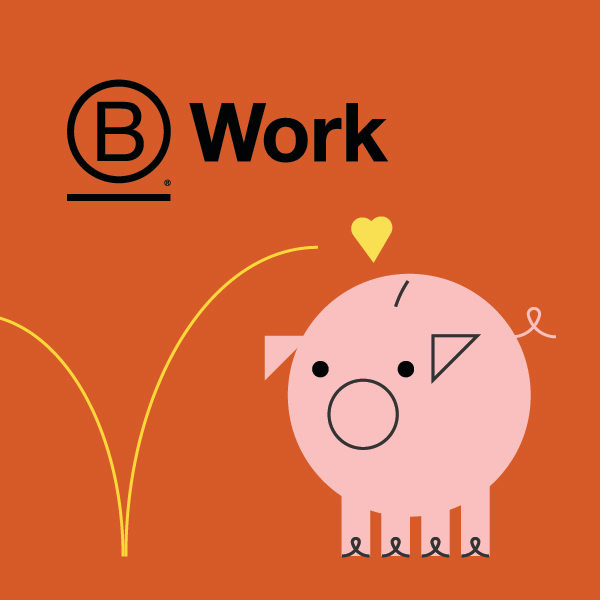Mission-Aligned Ways That B Corps Are Supporting Employees During the Great Resignation (and Beyond)
January 20, 2022
The waves of change that continue to rock the global economy and labor markets two years into the COVID-19 pandemic include record numbers of U.S. workers leaving their jobs — a movement dubbed “the Great Resignation.” While this worker exodus isn’t as evident in Canada as in the U.S. — and may be spreading next to western Europe — a mindset shift is gaining momentum among people around the globe who are re-examining their relationship with work and looking for employment that better aligns with their values and purpose. This is especially true of millennials and other younger people who soon will make up the majority of workers and lead companies in the 21st century.
Finding work with purpose isn’t a new concept, but its growing popularity has more business leaders taking notice and focusing on their company’s mission and values. Companies with established purpose — like Certified B Corporations that operate to benefit multiple stakeholders — provide examples of employee connection for others to follow.
By including workers, community, customers, and environment as valued stakeholders in their business decisions, B Corps commit to creating a more equitable economy that benefits all people. Employee supports and benefits vary at each B Corp, but these businesses share a commitment to interdependence and resilience nurtured by purpose.
B The Change reached out on the B Hive, an online platform for people in the B Corp community, to find examples of how B Corps are supporting employees and expanding, adjusting, and seeking input to create people-first workplaces with purpose.

Subscribe to B The Change Weekly
Learn more about this growing movement of Certified B Corporations using business as a force for good, and sign up to receive the B The Change Weekly newsletter for more stories like this one, delivered straight to your inbox once a week.
Family-First Work Environment
Captain Blankenship founder Jana Blankenship has a long-held belief that family comes first, and the company’s policies and practices reflect that. Employees of the female-led organic beauty product company all have young children and many have other caregiving responsibilities — and can shape their work schedules to best fit their needs. As team member Bernadette Hitt says, “We all have a tendency to work fairly typical hours, but it is such a benefit to be able to work non-traditional hours when necessary. To be able to pick up your child from school, attend a performance or sports activity, or help a family member is one of the best benefits a company can offer — a truly family-first policy.”
Focus on Wellness and Communication
Ingage Partners, an employee-owned consulting company, supports technology innovators by designing, building, and delivering software solutions. VP of People Kelly Williams says the Cincinnati, Ohio-based B Corp offers several programs and policies to support workers, including paid parental leave, a wellness program to support physical and mental health, and a family wellness budget stipend that was increased in 2021 as a result of the COVID-19 pandemic.
Ingage Partners involves workers in shaping these supports through a semi-annual employee engagement survey, quarterly coaching chats among employees and coaches that include questions about work environment and Ingage programs/policies, virtual town hall meetings, and an “Ask Me Anything” section during the all-employee monthly meetings. The company currently has a hybrid work schedule with three in-office days for in-person collaborative purposes. Williams says employees can adjust these days to at-home work if in-person collaboration is not needed, and the whole team’s schedule also is adjusted depending on the COVID-19 situation.

Helping to Build Financial Health
Legacy Vacation Resorts operates family getaways in Florida, Colorado, Nevada, and New Jersey. The B Corp has supported their team members before and during the pandemic initiatives including employee loan programs in New Jersey and Florida that offers bank assistance to employees in good standing (generally with a tenure of one year or greater) by providing loaned funds of $500-$2,500 for emergency expenditures. These loans help rebuild credit.
The B Corp also offers a range of flexible work schedules determined by department: Some are fully remote, some with hybrid schedules, and others with complete schedule flexibility for those able to do so within their job function. Other mission-aligned programs include four-week pay leave for parental or medical leave, scholarship opportunities for employee dependents, and health coverage that includes transgender surgeries and treatments.

The Future of Work Is Now
The community of Certified B Corporations knows that profits don’t have to come at the expense of other stakeholders. Learn more in this report.
New View of Worker (and Team) Success
MaCher uses data and academic research to design and manufacture sustainable branded products. With offices in Los Angeles, New York, Europe, and other countries, the B Corp has long offered flexibility to team members based on personal situations. The MaCher team now is 100% remote, with employees accountable for work quality and accomplishments rather than a specific schedule. When the pandemic subsides, the B Corp plans to offer the option of in-office work for those who prefer it.
Genevieve Lawrence, Director of Sustainability at MaCher, says the company has supported team members as they have moved for personal reasons or adjusted their work schedules during the COVID-19 pandemic. “We also bolstered our journey during the pandemic toward becoming a Teal organization, removing layers of hierarchy, shifting toward interdependency in accountability, and improving companywide transparency,” she says. The Teal work style includes self-managed teams, and Lawrence says major decisions that structurally affect the MaCher team or business are voted on, through a proposal and consent process by either the entire company or a smaller advice panel.
For other companies considering similar changes, she suggests asking “Why am I holding on to the belief that this is the way it needs to be done?” While MaCher previously held a mindset that some roles could only be successful in an office environment, Lawrence credits team members with challenging that thinking and asking to take their roles on the road.
One-Size-Doesn’t-Fit-All Approach
As it does with its market-leading personality, career, and organizational development assessments for clients, The Myers-Briggs Company strives to be candid and transparent with employees while using data to evaluate and adjust programs and other supports. Nicole Trapasso, VP Human Resources and OD, says that includes the fact that there may be appropriate regional variances of offerings to employees within the B Corp, which is headquartered in northern California but has offices in the UK, France, Netherlands, Australia, and Singapore. “One size does not necessarily fit all in terms of program and approach, so we carefully seek inputs from relevant groups and evaluate our options to align what is best not only with our B Corp status but regionally for our employees and business where it makes sense,” she says.
Remote or hybrid working is offered to most roles at The Myers-Briggs Company, and all employees are provided with the equipment and technology to support this. As employees re-evaluate their work and life schedules, Trapasso says, the B Corp has received and approved more requests to change working schedules and hours. “We have found that remote working has had a positive impact on recruitment,” she says. “It has enabled us to broaden our search and attract candidates for open positions that aren’t located close to our offices, enabling an increase in the socioeconomic diversity of candidates.”
The Myers-Briggs Company also recently launched inclusive support groups to help create safe spaces for colleagues who are a part of marginalized communities. This was an initiative of their DEI committee, which has been at the core of several projects within the company. As Traspasso says, “We try to empower our employees to lead on matters which are important to them personally and which could also materially positively impact our business and all we do as a B Corp. As an example, people in these support groups will be the main decision-makers in any DEI initiatives that affect their communities directly.”

Find Meaningful Work
B Work connects purpose-driven job seekers with positions at social enterprises that are using business as a force for good.
Create an Authentic Culture of Caring
Maryland-based B Corp Simplicity Works uses data-driven learning, design and marketing to help organizations connect with their audience, specializing in explainer videos through their brand Next Day Animations. HR Director Hannah Brown says Simplicity Works focused on supporting its team through the challenges of 2021 by deepening their culture of care — successfully growing their team and avoiding turnover amid the Great Resignation.
Simplicity Works says it has created strong connections with workers by being flexible; asking for input (and really listening); centering health and wellness; and making space for leadership. Employee-produced “Day in the Life” videos show a glimpse of workplace routines and the unique, fun company culture.
Brown says employee benefits and other supports that have kept team happiness high include personalized professional development plans and stipends; flexible scheduling and condensed work weeks; annual retreats; paid time off for volunteer days; and a bottom-up organizational chart that provides leadership opportunities for everyone regardless of position or tenure.
“We’ve made it a focus to create a culture of caring and authenticity, where it is OK to make mistakes and be your true self at work,” Brown says. “We want everyone to really love working here.”
Find Common Ground — and Flex on Fridays
Transcend, The Fearless Company, works with organizations to develop greater leadership, strategic thinking, and high-performing teamwork. CEO Laura Huckabee-Jennings says the Alabama-based B Corp supports its own team with a results-oriented workplace and liberal work-from-anywhere policies. “This became a real asset during the pandemic, when we simply expanded remote work to everyone all the time, and now employees have the option to work from where they are most productive,” she says.
Transcend uses a weekly five-question survey for an overall check on the company culture and regular one-on-one meetings with all employees to see how they are feeling and what they need or want to suggest. In August, the company implemented Flex Fridays to help its team cope with burnout and give people the option to use Fridays as additional weekend days or to take care of other errands that day. No team meetings or events are scheduled on Fridays and employees aren’t expected to respond to emails on those days. There are a few exceptions, when customers have product needs or other necessary work.
“To better support employees, you have to understand what the business needs and what the employee needs and work on finding common ground,” she says. “Some work has to be done during specific hours, and other work could be done anytime. Some issues are related to health, childcare or other needs that might require different solutions or levels of flexibility or support. Be clear on what problem you are trying to solve.”
Sign Up for our B The Change Newsletter
Read stories on the B Corp Movement and people using business as a force for good. The B The Change Newsletter is sent weekly.